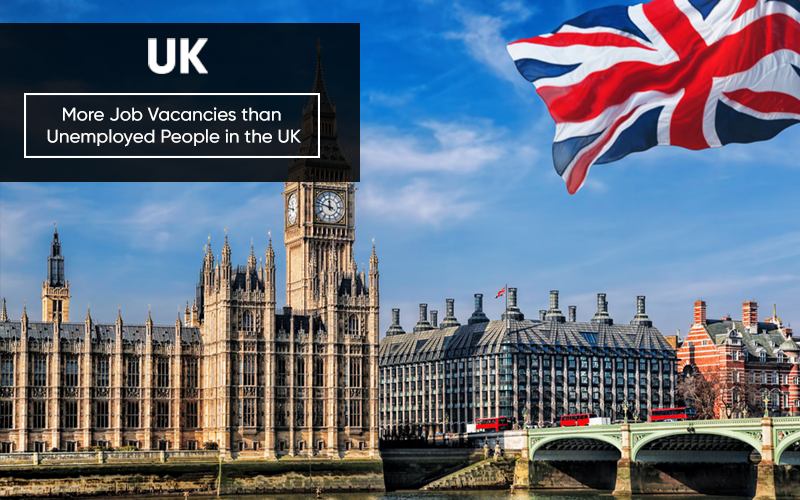With COVID-19, each country's economy hit its lowest, subsequently affecting the employment rate of every nation. Around 24% of the UK workforce was at risk during the lockdown. However, the statistics took a turn this year, and people got to witness the unusual, that is, the number of job opportunities is more than the unemployed people in the United Kingdom Investor Visa.
The more surprising fact is that even in times of recession period and inflation reaching its peak, the UK managed to boom in its employment sector and has, for the first time in its lifetime, shown the record of having more job vacancies than unemployed people in the UK, as per the ONS Labour Market figure released on 17th May 2022.
Furthermore, according to the numbers, the job vacancies were recorded to be 1,295,000 (around 1.3 Million) in March 2022, making it a piece of record-breaking news in UK history since 1974, with the unemployment rate lowering as low as 3.7 percent.
However, in the ensuing months, the rate of growth of job opportunities slowed down. As per the CMI (Chartered Management Institute), the UK is experiencing a “push me-pull your economy.”
Not just that, but according to the stats from January to March 2022. The employee's average total pay showed an increase of 7%, whereas the regular pay increased by about 4.2%.
What Are The Main ONS Findings?
The ONS report about the job opportunities showed the increment and decrement in various aspects. According to the LFS (Labour Force Survey), estimates for January-March 2022 show a decrease in the unemployment rate over the quarter and an increase in the employment and inactivity rate.
Though the stats show that the employment rate increased from 0.1% to 75.7% in the quarter, it is still lower than before COVID-19. The employment rate increase was seen amongst the people of age 16 to 64 (in years).
On the other hand, a mass movement of people from inactivity to employment was observed, whereas job to job or switching showed a record of 994,000 from January to March 2022.
Further, the working hours in a week increased by 14.8Million hours to 1.04Billion hours from January to March 2022, which is still 10.7 Million lower than the weekly working hours before the pandemic.
Reactions On ONS Figures:
Unite Kingdom Economy with the outbreak of the news and ONS figures about job opportunities being more than the unemployed people in the UK, there were statements from recognized people from all over the UK.
Some of them are as stated below:
The Director of Policy at CMI, Anthony Painter, said:
“We have a push me-pull your economy. On the one hand, they are soaring inflation, slowing growth, and a cost of living squeeze. Yet, unemployment is at historic lows, and vacancies are rising slower. Something has to give, and the betting, unfortunately, has to be that the impact of inflation and actual falling pay for millions will be a significant drag on economic growth.
Any drag on business activity will likely soften hiring, while household incomes are the most significant contraction since records began in 1964 – an economic storm is visible.”
“The recent energy price cap hike is set to fuel the April cost of living rise announcement due tomorrow. Although the cost of living pressures may have encouraged some workers back into the workforce – the tightness of the labor market makes it a tricky balancing act for both employers as there is still high demand for skilled workers.
If employers aren’t able to go the extra mile to support workers’ pay and conditions, they may find they lose valuable staff, which also increases costs in the short term. We saw many job moves in the year's first quarter.
On top of all of this, the Government has yet to go far enough to support struggling households, and that in turn appears to be placing pressure on businesses, given recent growth figures.
The picture is complex, but despite good news on jobs, severe warning signals are visible.”
Chief Executive of Learning and Work Institute, Stephen Evans, mentioned that:
“Real wages excluding bonuses saw their biggest monthly fall since 2013. This cost of living crisis will only intensify this year, making it vital that the Government does more to help people, particularly those on the lowest incomes. The obvious way to do this is to raise benefits, including Universal Credit, to match the price rise.”
“Below the surface, the labor market is less buoyant than it appears. For the first time since records began, there are fewer unemployed people than vacancies, and employers are finding it tough to recruit.
However, employment remains well below pre-pandemic levels, driven by the continuing rise of older people leaving the workforce. Employers and the Government need to act swiftly to encourage people back into the labor market.”
Director of the Work Foundation at Lancaster University Ben Harrison, commented:
“Despite employment continuing to rise, today’s figures underline the challenges facing workers who see inflation eat away at their living standards. With regular pay at 4.2% (excluding bonuses) being outpaced by rising inflation at 7% – and the Bank of England warning of a recession and that inflation could rise to 10% – workers in low-paid and insecure employment are facing huge uncertainty and tough choices as the cost of living crisis bites.”
“For weeks, the Government has hinted at extra help to come, yet all workers will have heard this week is that they are not to ask for pay rises and that if they’re struggling, they simply need to work more hours or get a better-paid job.”
“We must see targeted support delivered now via an Emergency Budget. As a priority, the Government must find a way to uprate benefits in line with inflation – or introduce measures to the same effect – to provide more security to those most in need.”
Chancellor of the Exchequer, Rishi Sunak commented:
“The unprecedented support we provided through our plan for the jobs has led to the jobs market remaining robust despite global challenges. With the unemployment rate near record-lows and the number of payrolled employees at a record high.”
“I understand that these are anxious times for people, but it’s reassuring that fewer people are out of work than was previously feared. We are helping them to keep more of their hard-earned money through tax cuts, changes to Universal Credit, and support with household bills billion this financial year.”
Head of EMEA research at global site Indeed, Pawel Adrian, said:
“The labor market remained solid footing despite the 0.1% contraction in GDP in March as hiring activity remained high. With 2.1 million people starting a new job in the first quarter of the year.”
“However, clouds are gathering on the UK’s economic outlook, and with the cost of living crisis deepening. This could be the strong last month before we see a slowdown in the labor market, which tends to be a lagging indicator.”
“While today’s update shows hiring challenges remain, record job to job moves in Q1 showed continued jobseeker confidence. And it’s encouraging to see the record flow from inactivity. which had been ticking up due to sickness, to employment, possibly driven by cost of living pressures.”
“The tight labor market has pushed regular pay growth up to 4.2% – the highest growth rate since May 2008, outside the pandemic period. Despite these record figures, in reality, pay isn’t keeping up with inflation. Adjusted for CPIH inflation, regular pay has fallen 1.2% yearly, the biggest drop since November 2013.”
Director of Public Affairs at Youth Charity Impetus, Steve Hains, said:
“If you are a young person who needs support, no level of vacancies suddenly makes you work ready. The Government must build on the Kickstart scheme with a targeted. Coordinated package of support that focuses on the longer-term needs of young people furthest from the labor market.” TUC Government is “missing in action” as the cost of living squeeze tightens The Trade Union Congress (TUC) held the UK government responsible as the nation’s cost of living crisis increased and stated them as “missing in action.”
As per the TUC analysis on 17 May 2022, the labor market shows:
- Real wages went down by £131 a month compared to last year for the public sector.
- Real wages went down by £68 a month compared to last year across the economy.
TUC General Secretary Francis O’Grady addressed the situation by saying:
“Working families deserve financial security. But millions are breaking point as real wages plummet and bills soar.”
“The government is missing in action at the worst possible time. Ministers must stop dithering and come back to parliament with an Emergency Budget. We urgently need a windfall tax on oil and gas companies to help fund energy grants for struggling households.”
According to the numbers, there is a record rise in payroll in the private sector by 11.7% from March 2021 to March 2022. Considered the highest annual increase since 2001, when comparable records were maintained. This was achieved by the rise in payrolls in double digits as well as a rise in bonuses too.
The numbers indicate that there are still 500,000 fewer people working compared to the pre-Covid times. On the other hand, economic inactivity has seen a growth of 600,000 amongst people aged 50 and more.
The Bank of England has officially stated that there are risks of higher pay in the private sectors. Resulting in higher prices is the sole reason for rising interest rates to dampen the demands.
IES Analysis- May 2024
With the job vacancies higher than the unemployed people in the UK. There is hope for the labor sector to gain its strength again after the pandemic. The stats show that around 1.15 million fewer people are in the workforce compared to pre-COVID times.
At the same time, about 0.5 million people are economically inactive due to caring responsibilities, illness and senior citizens of the country.
However, there is a flow of people in and out of economic inactivity and employment. Still, the graph of inactivity to work is much flat even when the job vacancies are abundant. It has been observed that the Government is cutting employment support when it should be surplus.
The only solution is to have a ‘Plan for Participation,’ including both Government and employers. To encourage more people into employment, increase workplace support, and better job designs.
At Immigration Experts, we guide your clients with the best possibilities of moving to the UK with regards to their professional background.
To Stay Updated on UK Immigration News, Subscribe to Immigration Experts
Fill up our Free Evaluation Form and take the initial step towards your Visa and Immigration Process. We are available for ONLINE CONSULTATION!
Contact Immigration Experts for FREE Points-Based Assessment of your profile: Drop us an email at: info@immigrationxperts.com
Give us a call at: +91-9999467686, 0120-6618011, 0120-6618123
Book your appointment with our experienced immigration counselors and solve all your immigration-related queries.
Achieve your Immigration dreams with Immigration Experts






